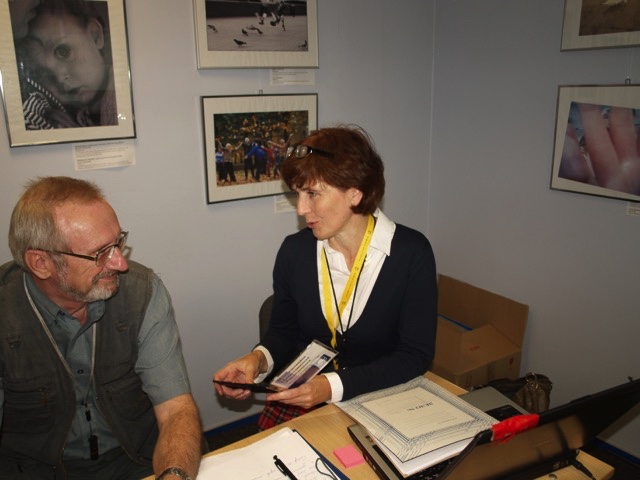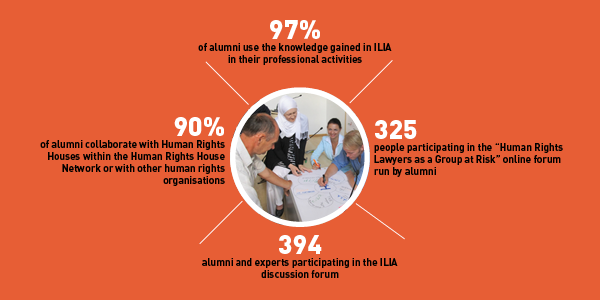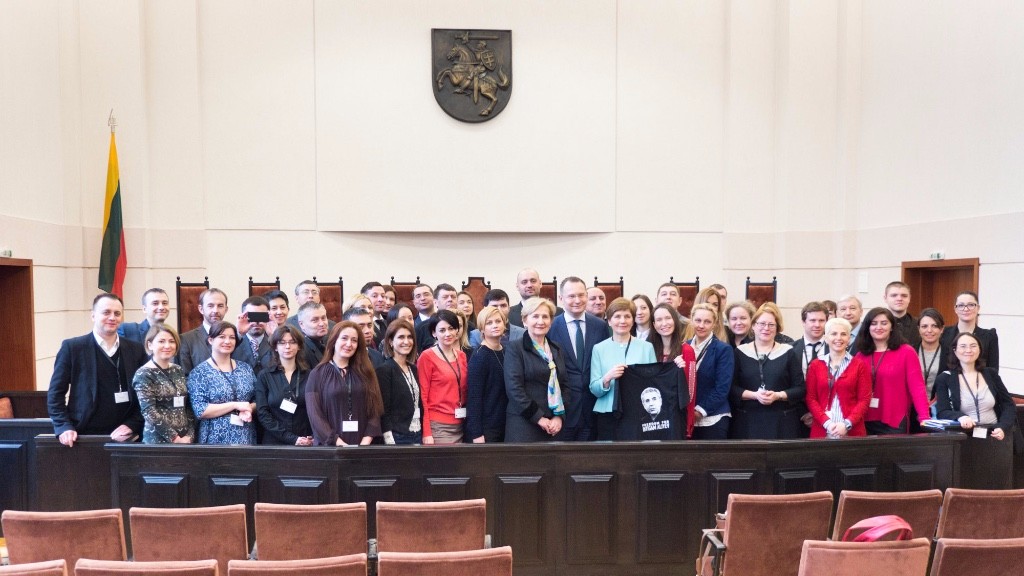In 2005, several non-governmental organisations (NGOs) from Belarus, Ukraine, and Poland, in cooperation with Human Rights House Foundation, started to design a program to teach Belarusian human rights defenders how to apply international legal standards in the national context.

Barys Zvozskau (1949–2012), former head of Belarusian Human Rights House member organisation Legal Initiative, and Liudmila Ulyashyna (manager of the ILIA programme) were among the initiators
The following year, Bring International Standards Home (BISH) was founded and two years later the first 27 human rights defenders and lawyers completed the course. After the first cycle, it became apparent that for security reasons it would be safer for some to participate remotely through e-learning courses. At the same time, more countries introduced laws reducing the space for civil society and increasing restrictions on the activities of non-governmental organisations, and authorities continue to persecute and prosecute human rights defenders and activists on politically motivated charges.
To address these challenges and developments, the programme was made available online in the form of Electronic Human Rights Education for Lawyers (EHREL) in 2009, and the success of the BISH programme has been extended to the wider region. Today, more than 150 lawyers and human rights defenders from Belarus, Ukraine, Russia, Moldova, and Azerbaijan participate in the alumni community, supported by the Human Rights House Network. The programme, which is taught in Russian, draws on the universality of human rights law to create a programme relevant and applicable in all participating countries.

The programme also aims at strengthening cooperation between ILIA lawyers and human rights organisations, to promote national protection of human rights and their defenders.
Liudmila Ulyashyna, Human Rights House Foundation and Manager of the ILIA programme, spoke on 10 years of ILIA: “I am happy to celebrate the 10-year ILIA anniversary together with ILIA alumni, my colleagues from the Human Rights Houses Network, and our friends from international and national human rights institutions. The ILIA programme is turning into a new stage with a stronger role of the Houses in its implementation. The main achievement that ILIA alumni regard themselves is that they are human rights defenders who are responsible for what is going in their countries. I wish to see a broader network of professionals educated in human rights and working together to make their home countries a better place to live in.”
10 years on – Seen from the participating countries
Ukraine
Serhiy Burov, chairperson, Educational Human Rights House Chernihiv was part of the group planning and establishing BISH. He is currently an expert with the ILIA programme. In the video below he discusses the importance of the programme and human rights education (subtitles in English).
He begins:
“The “International Law in Advocacy” program is important because its final goal is the implementation of international human rights standards at the state level. It is also important that legal representatives and human rights defenders from all over the world make their contribution to it. They are not only studying, but actually contributing their experience of international human rights protection and implementation of international standards at the national level. Education in human rights has been very important in the last years, and is going to be important in the future. In my opinion, education on human rights is also an instrument of human rights protection. Education can change and influence serious issues associated with human rights, and its results are strong, regardless of the huge amount of time you spend on it.”
Belarus
Belarusian human rights defenders celebrated the 10-year anniversary of the BISH programme at the Educational Human Rights House Chernihiv in July 2016, by starting its fourth cycle. At the event, Aleh Aheyeu, Head of the Legal Center of the Belarusian Association of Journalists, the coordinator of the project, commented:
“The program has taught people to use international mechanisms to defend violated rights, enabling them to bring to the international level the entire scope of the problems with human rights in Belarus. We strive to ensure that the project participants are motivated, aware of the values of human rights, and willing to promote and protect them.”
Ales Bialiatski, Head of Human Rights Center “Viasna” and expert of the project, commented:
“Such programs are important for the formation of the Belarusian human rights community to set and carry out tasks at the international level. We are not on the margins of civic events in Belarus, but rather on the contrary are their active participants. Belarusian human rights defenders now have to be considered both by opposition political forces and the government. We force them to do so with our activities and it is important to keep this rather high level.”
Azerbaijan
Intigam Aliyev, Azerbaijani lawyer and expert of the ILIA programme, addressed the Network Assembly of Human Rights Houses in a letter in November, in which he shared his experiences of the ILIA programme. He was unable to attend in person due to travel restrictions for his legitimate human rights work:
“This unique program [ILIA] made it possible for human rights defenders to not only improve their skills through online courses, but also live together with members of the governing body, international experts to discuss the most urgent human rights issues, share experiences and problems, to carry out joint ventures – protests, actions in support of political prisoners, to monitor courts cases of public interest, to do the comparative analysis of the legislation of our countries and its practical application. Through these programs, our country gained many civil society leaders, international experts, excellent trainers and teachers in the field of international law and human rights. I am proud to say that now many former graduates of our program are working in the Court, in the structures of the UN, OSCE, Council of Europe, the Red Cross and other international organizations, the Bar Association, in the Ombudsman Office in the Universities of the countries. We keep in touch with them, closely cooperate with them and many of them are our friends.”
Russia
At a conference with ILIA lawyers in Tbilisi on 11–12 December, organised by the Russian Research Centre for Human Rights, Larisa Boichenko, ILIA regional coordinator for North Russia, commented on the cross-border benefits of the programme:
“A win of one lawyer or human rights defender against the arbitrariness of autocratic bureaucracy in any of our states is always a common victory which gives hope to everyone else. It is impossible to break through the wall with your finger but it is more realistic to make it with a fist. We are the fingers of a hand. A palm may protect us from violence and can also pat. But it can be also a fist that could be a weapon defending human rights and hence to fight for the quality of peoples lives in our countries.”
Marina Dubrovina, Russian lawyer and ILIA alumni, said:
“International and cross-border networking of lawyers is necessary and important for mutual assistance in concrete cases, but also to formulate general recommendations related to the protection of human rights. It is possible to establish and develop these forms of cooperation through the international human rights network of lawyers – in joint meetings, discussions on the specific topics, education, and training.”
ILIA activities in 2016
ILIA’s online education programme (EHREL) concluded its third cycle with a two-day conference in February; the fourth cycle of the Bring International Standards Home (BISH) programme began in July 2016; and alumni and experts met regionally for conferences, took part in ILIA programmes such as trial observation in Azerbaijan, and regularly used ILIA’s online forums.
On top of this, dozens of lawyers and human rights defenders from the programme attended HRHN consultations in Belgrade in June 2016 to give input to the report of the Special Rapporteur on Judges and Lawyers. HRHF’s 2015 Human Rights Lawyers at Risk report, based on the work of ILIA lawyers, formed the basis for the consultations.
Implementing partners of ILIA
- Barys Zvozskau Belarusian Human Rights House (Belarus/Lithuania)
- Educational Human Rights House Chernihiv (Ukraine)
- Helsinki Foundation for Human Rights (Poland)
- Human Rights Embassy (Moldova)
- Human Rights House Foundation (Norway)
- Legal Education Society (Azerbaijan)
- Russian Research Centre on human rights (Russia)
- Ukrainian Helsinki Union on Human Rights
- Belarusian Association of Journalists (Belarus)
- Belarusian Helsinki Committee (Belarus)
- Legal Initiative NGO (Belarus)
- Human Rights Centre “Viasna” (Belarus)
- MART NGO (Ukraine)
See more partners and donors here: www.humanrightshouse.org/projects/ILIA





